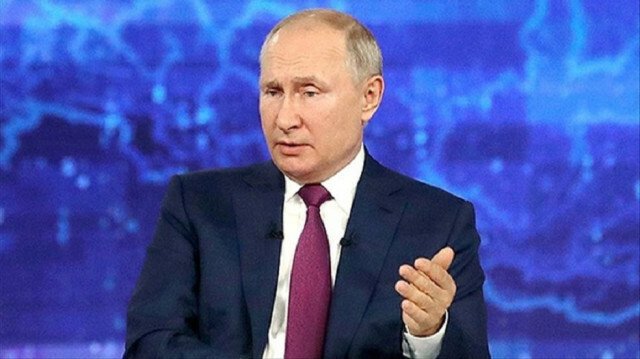
Russian president says military contractors could be active in guarding mining operations in West African country
Russian private military companies could be active in Mali, President Vladimir Putin admitted on Thursday.
Such contractors could be serving in roles connected to guarding mining operations, Putin said at a meeting of the Valdai Discussion Club in the resort city of Sochi in southern Russia.
"This is a private business, private interests, related to -- among other things -- the extraction of energy resources and other resources -- gold, gems," he said.
The president stressed that as private companies, private military companies do not represent the interests of the Russian state and are not deployed by Russian authorities.
If their activities contradict the interests of Russia as a state, however, Russian officials will take action.
- Russia, US move forward on Geneva decisions
Turning to Russia-US relations, Putin said a summit in Geneva with US President Joe Biden earlier this year had been "productive" and boosted impetus towards normalization.
"Though the set of issues we agreed on (in Geneva) is small, we're still on the right track. These are today's most important issues and in general, the administration on the American side and Russia on the other side are fulfilling their plans and moving forward on this path," he said on the meeting held in June.
Putin added that he had the impression that Washington aimed to build and revive relations in some important areas.
Kremlin spokesman Dmitry Peskov said on Wednesday that a new meeting between the Russian and US leaders could take place by the end of the year.
- Thawing Armenia-Turkey relations
Addressing the settlement last year of the conflict for the Nagorno-Karabakh region, Putin said that despite all obstacles, Azerbaijani President Ilham Aliyev and Armenian Prime Minister Nikol Pashinyan had managed to stop the bloodshed.
"It is necessary to create conditions for a long-term settlement in the region as a whole, which can be created if the parties accept the agreements on Karabakh as long-term, to be able to assess the benefits of peace," he said.
Putin underlined that both sides would benefit from the peace, with Azerbaijan now able to have normal connections with its exclave Nakhchivan and Armenia profiting from building economic relations.
"Armenia is interested in establishing normal economic activity, including with Azerbaijan, to unfreeze its relations with Turkey, to give them a modern character," he said.
The main point will be to create a situation of security and build relationships between Armenia and Azerbaijan in a positive way, he added.
Another important thing, said Putin, will be to settle the situation on the border, adding that this would be impossible without Russia.
- Liberation of Karabakh
Relations between the former Soviet republics of Azerbaijan and Armenia have been tense since 1991, when the Armenian military occupied Nagorno-Karabakh, also known as Upper Karabakh, a territory internationally recognized as part of Azerbaijan, and seven adjacent regions.
When new clashes erupted on Sept. 27, 2020, the Armenian army launched attacks on civilians and Azerbaijani forces, and violated several humanitarian cease-fire agreements.
During the 44-day conflict, Azerbaijan liberated several cities and nearly 300 settlements and villages from the nearly three-decade occupation.
On Nov. 10 last year, the two countries signed a Russian-brokered agreement to end the fighting and work toward a comprehensive resolution.
On Jan. 11, the leaders of Russia, Azerbaijan and Armenia signed a pact to develop economic ties and infrastructure to benefit the entire region. It included the establishment of a trilateral working group on Karabakh.
The cease-fire is seen as a victory for Azerbaijan and a defeat for Armenia, whose armed forces withdrew in line with the agreement.
Prior to this victory, about 20% of Azerbaijan's territory had been under illegal occupation for nearly 30 years.

